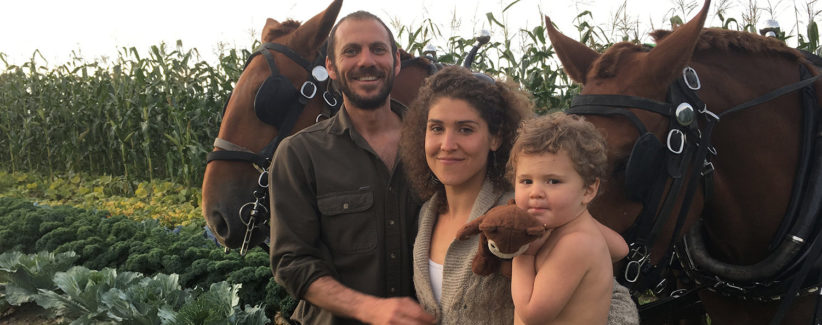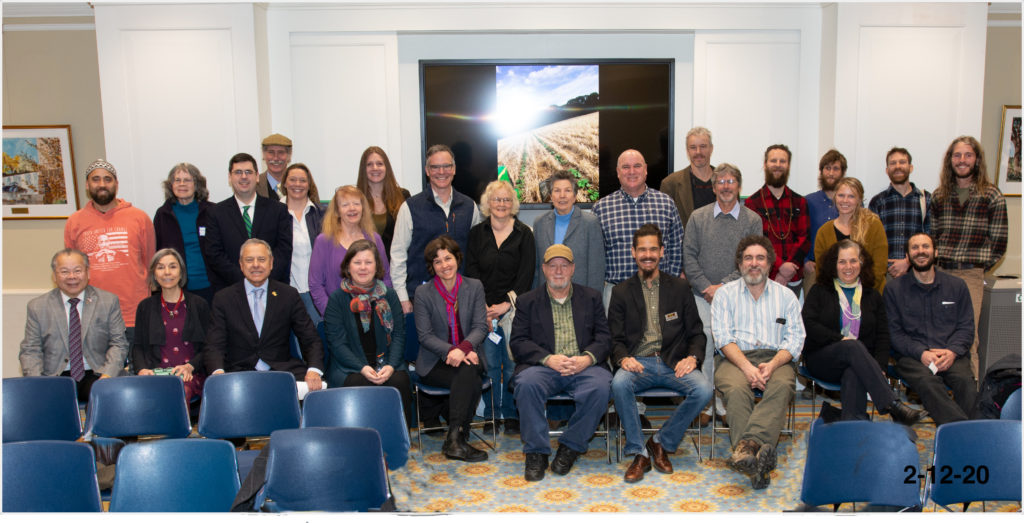Healthy Soils Bill

The below article is reprinted with permission from Lincoln Fishman of Sawyer Farm, shown above. Lincoln and Gaining Ground’s Doug Wolcik attended an event on February 12, which was organized by NOFA Massachusetts and assembled ten farmers from around the state to speak at the Massachusetts State House in support of the Healthy Soils Bill. We are grateful to be able to share Lincoln’s thoughtful recollections of the day.
I went to the State House yesterday to advocate for the Healthy Soils Bill. It’s a climate change bill for farmers… It would establish a Healthy Soils Program in Massachusetts, which would make technical assistance and grant money available to farmers who adopt or use practices that remove atmospheric carbon dioxide (CO2) and put it into the soil.
What does that mean? Plants take carbon dioxide out of the atmosphere and combine it with water to make sugar. They use about half of that sugar for their own energy and donate the other half to microbes and fungi in the soil that trade nutrients and minerals in exchange. That carbon becomes part of their bodies and ultimately mostly stays in the soil. Over time, this leads to huge amounts of carbon being stored in the soil. Soil is earth’s largest carbon sink. It contains 2,500 billion tons of carbon—the atmosphere only has 800 billion tons.
Natural ecosystems are good at capturing atmospheric carbon dioxide and storing it in the soil; conventional farming is not. Over 50 percent of the carbon in cultivated soil has been released into the atmosphere—about 25 percent of all anthropogenic emissions. That’s because of tillage—turning the soil exposes it to atmospheric oxygen and causes carbon to break down quickly into CO2. It’s also because the chemicals used in conventional farming kill the soil, so plants don’t have trading partners for their excess sugar.
Cover crops address most of these issues on our farm. They hold the soil in place, support huge microbial populations, and don’t get harvested, so their roots and shoots get fed back to the soil. Compost puts a lot of carbon into the soil too, so that soil life has plenty of food as it waits for crops to mature and exude sugar. We also do a bunch of other things that I won’t get into for brevity’s sake.
Down the road, this bill would provide technical assistance and grant money to farmers who want to adopt carbon-capturing practices, or farms like ours that want to experiment with new ideas.
This is a really critical issue for climate change. It’s about flipping agriculture from CO2 source to CO2 sink. Imagine if we realized we’d engineered cars backwards and there was actually a way to remove CO2 from the atmosphere by driving more. It’s like that.
If you feel moved to call your representative or senator about this bill, the time is now. You could just say, for example, “I support the Healthy Soils Bill. It’ll help farmers fight climate change. I want to see it get passed and funded!”
About ten of us farmers spoke at the legislative briefing today. It was a pleasure to be in a room full of people who are motivated by soil. Below are my unedited notes.
NOTES
When we started farming, it was about do no harm—drop out of the system. But in those 15 years, there’s been a lot of exciting science. And you’ve heard about it today—that good farming practices can actually capture carbon and put it back in the soil where it belongs. For me and the other farmers in this room, that’s incredibly motivating. It means that not only can we grow healthy food, but we can actually roll back the effects of climate change as we do it. This bill takes our energy, and our individual efforts, and gives it structure and focus.
State and federal farm policy is still stuck back where my thinking was at 15 years ago. Mitigate damage, reduce harm. What’s exciting about this bill is that it takes the best farming practices, and the most recent science, and links them with public policy. It’s positive and proactive.
On a deeper level, it acknowledges that soil health is the foundation that human health, human industry, everything we’ve been working towards, is built on. This bill begins to elevate soil to its rightful place in the public imagination, in public discourse, and in public policy.
To me, this is a no-brainer. I’m here because I want this to be the beginning of a dialogue, because the next step is funding and the nitty-gritty. I look forward to getting into all that with you.
Thank you.
—Lincoln Fishman, Sawyer Farm, Worthington, Mass.
